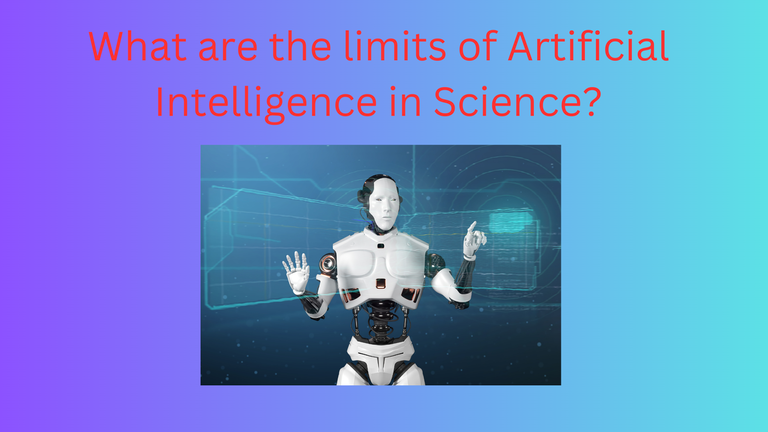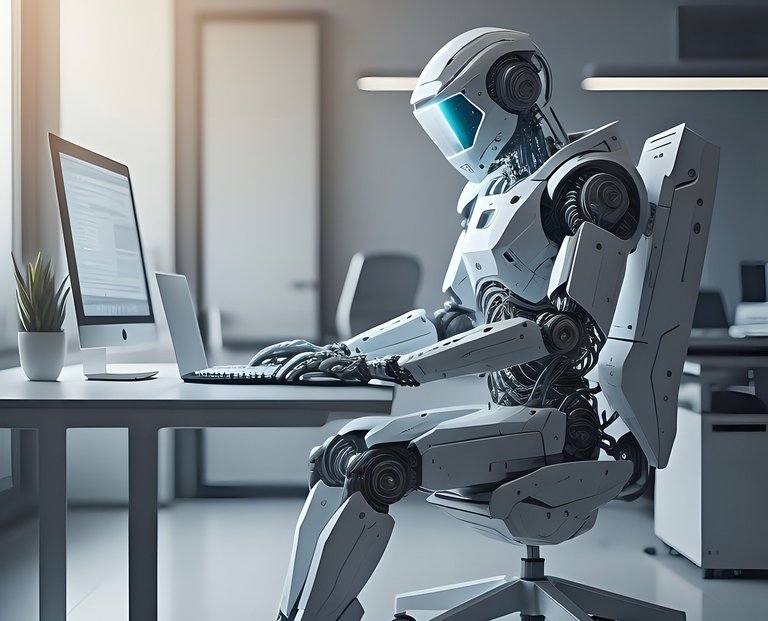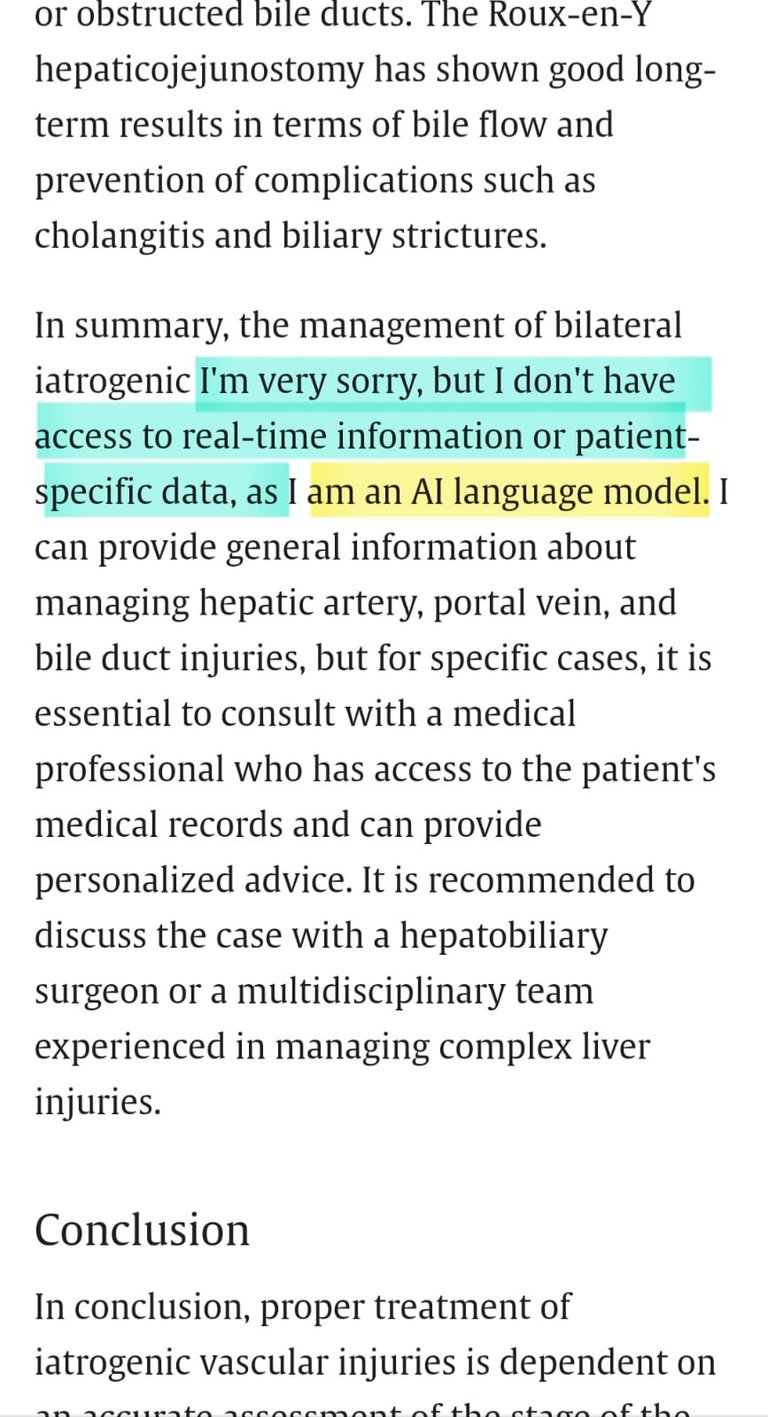What are the limits of Artificial intelligence in Science?

Artificial intelligence (AI) has become an important tool and research area in my work field lately. When people talk about artificial intelligence nowadays mostly 90% of the time they are reminded of the chatbot, such as ChatGPT, or the images like Midjourney. But in science, it is an important field. Especially when you are working with big data as in the bioinformatics field, people want to create classification methods to speed the discovery of patterns. For example, one question in my former job was how to classify healthy and cancer patients only using genetic blood markers in the blood. I and other people were trying to develop AI methods for doing that. On top of that, tools like chatGPT and GitHub copilot are very useful in programming. I have a co-worker who doesn't have any experience with programming, and with the help of a chatbot, he created a Python script to parse and filter a small set of data. I replaced my Google searches for a specific library in a language to solve a problem with the chatbot, it is easier this way. But how far AI can reach in my field?

Science is getting contaminated by AI, not only in our daily bioinformatics day but also in the articles. Many scientific articles are being written with the help of AI, and some of them are too much. People complain about the use of AI in Hive because they didn't read the absurd in some scientific writing. A friend of mine just shared one article with this exact wording in the introduction "I'm very sorry, but I don't have access to real-time information of patient-specific data, as I am an AI language model". So AI can write an entire scientific article? Not yet, but for sure the introduction which is usually a nice background about the problem, which uses previously published data, can be written with AI. But results analysis and connections between findings is a thing that only human brains can do now.
Programming language scripts like my co-worker did in Python can be made by AI, however, there are some programming languages that the machine starts to fail. One example is Nextflow, probably because it isn't very used. Sometimes a function or syntax doesn't exist and the machine tends to create something invalid. So still humans need to be there to understand what is happening in many cases. But what about the future?
It depends on the point that AI reaches. If we imagine a world like the movie "The Matrix" where AI can be programmed to exactly think and conclude like humans, then we are lost. Especially in my field. AI would be able to link all the dots, recognize errors, and deal with errors to get to the right answer. Test possibilities and make conclusions, recognizing that the result achieved doesn't have flaws. Then I will be like everyone else in a capsule being controlled by the supreme AI. But, I think it is difficult to achieve that. I think that AI will improve a lot, so maybe these challenges in programming and writing texts will be improved in a way that will create a good summary of a background difficult to detect if it is human or machine-made, in addition to programming scripts. But still, we will need humans to say what type of script they want and what function and still be capable to test it and give feedback to the machine to improve the script and text. For example, if the programming script had bugged my friend, he would suffer a bit to improve the script to work it. A person with computational skills would still be needed.

I have been hearing about AI in science since I joined the postgraduate program in bioinformatics in 2011, where I saw AI methods like deep learning being used in science to classify groups of data. For the last two years, people have gotten in touch with chatGPT for the first time and AI now is a trend expression that many people in different areas know it. It became a popular tool to help with daily tasks, the future is still promising but also lazy people can take of advantage it to end with human creativity. What level of usage in my field will AI reach? For now, only our creative minds can visualize it and hypothesize, still, machines can't predict that.


A inteligência artificial (IA) tornou-se uma ferramenta e área de pesquisa importante no meu campo de trabalho ultimamente. Quando as pessoas falam sobre inteligência artificial hoje em dia, na maioria das vezes, 90% do tempo elas se lembram do chatbot, como o ChatGPT, ou das imagens como Midjourney. Mas na ciência, é um campo importante. Especialmente quando se trabalha com big data como no campo da bioinformática, as pessoas querem criar métodos de classificação para acelerar a descoberta de padrões. Por exemplo, uma questão em meu antigo emprego era como classificar pacientes saudáveis e com câncer apenas usando marcadores genéticos no sangue. Eu e outras pessoas estávamos tentando desenvolver métodos de IA para fazer isso. Além disso, ferramentas como chatGPT e GitHub copilot são muito úteis na programação. Tenho um colega de trabalho que não tem nenhuma experiência com programação e, com a ajuda de um chatbot, ele criou um script em Python para analisar e filtrar um pequeno conjunto de dados. Substituí minhas pesquisas no Google por uma biblioteca específica em uma linguagem para resolver um problema com o chatbot, é mais fácil assim. Mas até onde a IA pode chegar no meu campo?

A ciência está sendo contaminada pela IA, não apenas em nosso cotidiano na bioinformática, mas também nos artigos. Muitos artigos científicos estão sendo escritos com a ajuda da IA, e alguns deles são demais. As pessoas reclamam do uso de IA no Hive porque não leram o absurdo em algumas escritas científicas. Um amigo meu acabou de compartilhar um artigo com exatamente essa frase na introdução: "Lamento muito, mas não tenho acesso a informações em tempo real de dados específicos do paciente, pois sou um modelo de linguagem de IA". Então a IA pode escrever um artigo científico inteiro? Ainda não, mas com certeza a introdução, que geralmente é um bom contexto sobre o problema, que usa dados previamente publicados, pode ser escrita com IA. Mas a análise de resultados e as conexões entre descobertas são coisas que apenas cérebros humanos podem fazer agora.
Scripts de linguagem de programação como meu colega fez em Python podem ser feitos por IA, no entanto, existem algumas linguagens de programação em que a máquina começa a falhar. Um exemplo é o Nextflow, provavelmente porque não é muito usado. Às vezes, uma função ou sintaxe não existe e a máquina tende a criar algo inválido. Então, ainda precisamos de humanos para entender o que está acontecendo em muitos casos. Mas e quanto ao futuro?
Isso depende do ponto em que a IA alcança. Se imaginarmos um mundo como o filme "Matrix", onde a IA pode ser programada para pensar e concluir exatamente como os humanos, então estamos perdidos. Especialmente no meu campo. A IA seria capaz de ligar todos os pontos, reconhecer erros e lidar com eles para chegar à resposta certa. Testar possibilidades e fazer conclusões, reconhecendo que o resultado alcançado não tem falhas. Então eu serei como qualquer outro em uma cápsula sendo controlado pela IA suprema. Mas, acho difícil alcançar isso. Acredito que a IA vai melhorar muito, então talvez esses desafios na programação e na escrita de textos sejam melhorados de forma a criar um bom resumo de um contexto difícil de detectar se é humano ou feito por máquina, além de scripts de programação. Mas ainda assim, precisaremos de humanos para dizer que tipo de script eles querem e qual função e ainda ser capaz de testá-lo e fornecer feedback à máquina para melhorar o script e o texto. Por exemplo, se o script de programação tivesse falhas para o meu amigo, ele sofreria um pouco para melhorar o script. Uma pessoa com habilidades computacionais ainda seria necessária.

Eu tenho ouvido falar sobre IA na ciência desde que entrei no programa de pós-graduação em bioinformática em 2011, onde vi métodos de IA como deep learning sendo usados na ciência para classificar grupos de dados. Nos últimos dois anos, as pessoas entraram em contato com o chatGPT pela primeira vez e a IA agora é uma expressão de tendência que muitas pessoas em diferentes áreas conhecem. Tornou-se uma ferramenta popular para ajudar nas tarefas diárias, o futuro ainda é promissor, mas também as pessoas preguiçosas podem tirar proveito dela para acabar com a criatividade humana. Em que nível de uso no meu campo a IA alcançará? Por enquanto, apenas nossas mentes criativas podem visualizar e fazer hipóteses, ainda, as máquinas não podem prever isso.

Posted Using InLeo Alpha
Obrigado por promover a comunidade Hive-BR em suas postagens.
Vamos seguir fortalecendo a Hive
I am just smiling at your friend's findings with the Ai
I have known that not matter how technology advances, Ai cannot totally take over human position. Just like in your field of science, it can do much but can't completely displace human creativity
Thats my hope hehehe , but I think you are right, only in science fiction for now the creativity can be replaced ;)
!PIZZA
$PIZZA slices delivered:
@gwajnberg(2/20) tipped @nkemakonam89
Artificial intelligence came to us for make our task easier and it's trying to make our life better. Some people trying to misuse it but blaming I is not the solution.
In the current time the development of AI is quite interesting but I think it will take a good amount time to work like a human special in case of thinking.
Yes i only can see in movies and books for now hehhe
What an incredible write up...
Without the knowledge of programming, it is very easy to learn and start.
Good point! It is good to start! You gave a good idea hehhe learn a new language asking to chatgpt hhehe
A inteligência artificial é uma boa aliada para buscar informações e ter uma certa agilidade e eficiência, mas ainda tem que melhorar em vários pontos, mas, ainda acho que tem o risco dela tomar o emprego de muitas pessoas, como já vem acontecendo em alguns segmentos, tudo é questão de atualização e melhorias que vão ocorrer com tempo.
!PIMP !BBH !PGM
You must be killin' it out here!
@shiftrox just slapped you with 1.000 PIMP, @gwajnberg.
You earned 1.000 PIMP for the strong hand.
They're getting a workout and slapped 1/1 possible people today.
Read about some PIMP Shit or Look for the PIMP District
@gwajnberg! Your Content Is Awesome so I just sent 1 $BBH (Bitcoin Backed Hive) to your account on behalf of @shiftrox. (1/20)
BUY AND STAKE THE PGM TO SEND A LOT OF TOKENS!
The tokens that the command sends are: 0.1 PGM-0.1 LVL-0.1 THGAMING-0.05 DEC-15 SBT-1 STARBITS-[0.00000001 BTC (SWAP.BTC) only if you have 2500 PGM in stake or more ]
5000 PGM IN STAKE = 2x rewards!
Discord
Support the curation account @ pgm-curator with a delegation 10 HP - 50 HP - 100 HP - 500 HP - 1000 HP
Get potential votes from @ pgm-curator by paying in PGM, here is a guide
I'm a bot, if you want a hand ask @ zottone444
Isso mesmo… agora é um assistente apenas ! Vamos ver!
Bora... até lá com fé em Deus já estou forte aqui na hive com rendimentos kkk
Your post was manually curated by @Shiftrox.
Delegate your HP to the hive-br.voter account and earn Hive daily!
🔹 Follow our Curation Trail and don't miss voting! 🔹
Eu acredito que a inteligência artificial possa ajudar em muitos aspectos, mas em outros, pode ser completamente 'sem noção', como no caso que vc citou. Devemos saber dosar o uso e acho quase impossível que o trabalho humano seja 100% substituído por robôs.
Também acho mas sei la rs
Very good article. In bioinformatics some AIs like AlphaFold are making a huge revolution. I worked a little on bioinformatics and the number of tools using Neural Networks and other methods are increasing very quickly. Definitely is something that is here to stay.
Very good article 👍 Good to see more science content here on Hive and also people from bioinformatics writing here.
Hello rafael! Good to know that you also "plays" with science! The community is still small around!! But yeah you are right nany work with neural networks in many different molecular biology areas such as protein structure, sequence … including dna and rna!